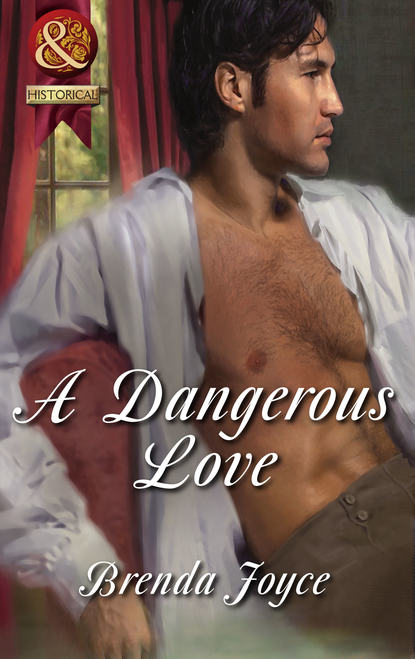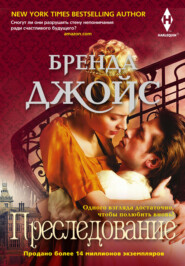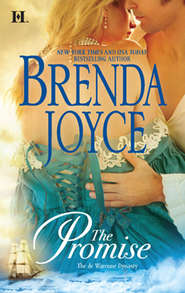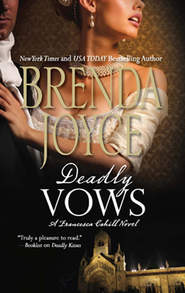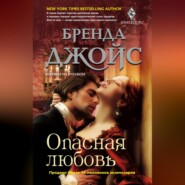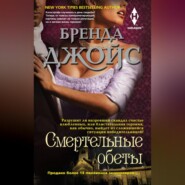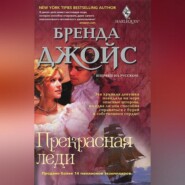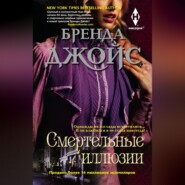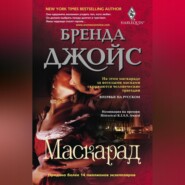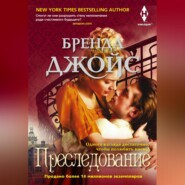По всем вопросам обращайтесь на: info@litportal.ru
(©) 2003-2025.
✖
A Dangerous Love
Настройки чтения
Размер шрифта
Высота строк
Поля
“But she wept like a woman dying,” Smith said, unlocking the shackle on the boy’s ankle. “I couldn’t understand their Gypsy speech, but I didn’t have to. She wanted him to go—and he didn’t want to leave. He’ll run off.” Smith looked at Edmund in warning. “Ye’d better lock him up at night an’ keep a guard on him by day.” He seized his arm. “Boy, show respect to yer father—a great lord. If he speaks, ye answer.”
“It’s all right. This is a shock.” Edmund smiled at his son. God, he was a beautiful boy—except for his eyes and coloring, he looked exactly like Raiza. So much warmth began, flooding his chest. He should have never turned Raiza away so many years ago, he thought. But surely they could get past what he had done. Surely they could get past this terrible beginning and their differences. “Emilian,” he smiled. “Long ago, your mother brought you here and introduced us. I am Lord Edmund St Xavier.”
The boy’s expression did not change. He reminded Edmund of a deadly, darkly golden tiger, waiting for the precise moment to leap and maim.
Taken aback, Edmund reached for the ropes on his wrists. “Give me a knife,” he said to Smith.
“Ye’ll be sorry,” Smith said, handing him a huge blade.
John murmured, “The boy is as feral as I expected.”
Edmund ignored both comments, cutting the ties. “That must feel better.” But the boy’s wrists were lacerated. He was furious with the runner now.
The boy stared coldly. If his wrists hurt, he gave no sign— and Edmund knew he wouldn’t.
“Better guard your horses,” John murmured from behind them, a snicker in his tone.
Edmund did not need his smug brother’s presence now. Getting past his son’s hostility was going to be difficult enough. He couldn’t begin to imagine how he’d turn him into an Englishman, much less become a real father to him.
The boy had become still, staring closely, his expression wary. Edmund almost felt as if he were looking at a wild animal, but John was wrong, because Gypsies weren’t beasts and thieves—he knew that firsthand. “Can you speak English? Your mother could.”
If the boy understood, he gave no sign.
“This is your life now,” Edmund tried with a smile. “Long ago, your mother brought you here. I was a fool. I was afraid of what my wife would say, do. I turned you away—and for that, I will always be sorry. But Catherine is gone, God bless her. My son Edmund—your brother—is gone. Emilian, this is your home now. I am your father. I intend to give you the life you deserve. You are an Englishman, too. And one day, Woodland will be yours.”
The boy made a harsh sound. He looked Edmund up and down with scorn and shook his head. “No. I have no father— and this is not my home.”
His English was accented, but he could speak. “I know you need some time,” Edmund cried, thrilled they were finally speaking. “But I am your father. I loved your mother, once.”
Emilian stared at him, his face twisted as if with hatred.
“This has to be a difficult moment, meeting your father and accepting that you are my son. But Emilian, you are as much an Englishman as I am.”
“No!” Emilian snarled. And he said proudly, head high, “No. I am Rom.”
CHAPTER ONE
Derbyshire, the spring of 1838
SHE WAS SO ENGROSSED in the book she was reading that she didn’t really hear the knocking on her door until it became pounding. Ariella started, curled up in a canopied four-poster bed, a book about Genghis Khan in her hands. For one more moment, visions of a thirteenth-century city danced in her mind, and she saw well-dressed upper-class men and women fleeing in panic amidst artisans and slaves, as the Mongol hordes galloped through the dusty streets on their warhorses.
“Ariella de Warenne!”
Ariella sighed. She had been able to smell the battle, as well as see it. She shook the last of her imaginings away. She was at Rose Hill, her parent’s English country home; she had arrived last night. “Come in, Dianna,” she called, setting the history aside.
Her half sister, Dianna, her junior by eight years, hurried in and stopped short. “You’re not even dressed!” she exclaimed.
“I can’t wear this gown to supper?” Ariella said with mock innocence. She didn’t care about fashion, but she did know her family, and at supper the women wore evening dresses and jewels, the men dinner jackets.
Dianna’s eyes popped. “You wore that dress to breakfast!”
Ariella slid to her feet, smiling. She still couldn’t get over how much her little sister had matured. A year ago, Dianna had been more child than woman. Now it was hard to believe she was only sixteen, especially clad in the gown she was wearing. “Is it that late?” Vaguely, she glanced toward the windows of her bedroom and was surprised to see the sun hanging low in the sky. She had settled down with her tome hours ago.
“It is almost four and I know you know we are having company tonight.”
Ariella did recall that Amanda, her stepmother, had mentioned something about supper guests. “Did you know that Genghis Khan never initiated an attack without warning? He always sent word to the countries’ leaders and kings asking for their surrender first, instead of simply attacking and slaying everyone, as so many historians claim.”
Dianna stared, bewildered. “Who is Genghis Khan? What are you talking about?”
Ariella beamed. “I am reading about the Mongols, Dianna. Their history is incredible. Under Genghis Khan, they formed an empire almost as large as that of Great Britain. Did you know that?”
“No, I did not. Ariella, Mother has invited Lord Montgomery and his brother—in your honor.”
“Of course, today they inhabit a far smaller area,” Ariella said, not having heard this last bit. “I want to go to the Central Steppes of Asia. The Mongols remain there today, Dianna. Their culture and way of life is almost unchanged since the days of Genghis Khan. Can you imagine?”
Dianna grimaced and walked to a closet, pushing through the hanging gowns there. “Lord Montgomery is your age and he came into his title last year. His brother is a bit younger. The title is an old one, the estates well run. I heard Mother and Aunt Lizzie talking about it.” She pulled out a pale blue gown. “This is stunning! And it doesn’t look as if you have worn it.”
Ariella didn’t want to give up on her sister yet. “If I give you this history to read, I am certain you will enjoy it. Maybe we can all go to the steppes together! We could even see the Great Wall of China!”
Dianna turned and stared.
Ariella saw that her little sister was losing patience. It was always hard to remember that no one, not even her father, shared her passion for learning. “No, I haven’t worn the blue. The supper parties I attend in town are filled with academics and Whig reformers, and there are few gentry there. No one cares about fashion.”
Holding the gown to her chest, Dianna shook her head. “That is a shame! I am not interested in Mongols, Ariella, and I cannot truly understand why you are. I am not going to the steppes with you—or to some Chinese wall. I love my life right here! The last time we spoke, you were in a tizzy about the Bedouins.”
“I had just returned from Jerusalem and a guided tour of a Bedouin camp. Did you know that our army uses Bedouins as scouts and guides in Palestine and Egypt?”
Dianna marched to the bed and laid the gown there. “It’s time you wore this lovely dress. With your golden complexion and hair and your infamous de Warenne blue eyes, you will turn heads in it.”
Ariella stared, instantly wary. “Who did you say was coming?”
Dianna beamed. “Lord Montgomery—a great catch! They say he is also handsome.”
Confused, Ariella folded her arms across her chest. “You’re too young to be looking for a husband.”
“But you’re not,” Dianna cried. “You didn’t hear me, did you? Lord Montgomery has just come into his title, and he is very good-looking and well educated. I have heard all kinds of gossip that he is in a rush to wed.”
Ariella turned away. She was twenty-four now, but marriage was not on her mind. Ever since she was a small child, she had been consumed with a passion for knowledge. Books—and the information contained within them—had been her life for as long as she could remember. Given a choice between spending time in a library or at a ball, she would always choose the former.
Luckily, her father doted on her and encouraged her intellectual pursuits—and that was truly unheard of. Since turning twenty-one, she had resided mostly in London, where she could haunt the libraries and museums, and attend public debates on burning social issues by radicals like Francis Place and William Covett. But despite the freedoms, she wished for far more independence—she wanted to travel unchaperoned and see the places and people she had read about.
Ariella had been born in Barbary, her mother a Jewess enslaved by a Barbary prince. She had been executed shortly after Ariella’s birth for having a fair-skinned child with blue eyes. Her father had managed to have Ariella smuggled out of the harem and she had been raised by him since infancy. Cliff de Warenne was now one of the greatest shipping magnates of the current era, but in those days, he had been more privateer than anything else. She had spent the first few years of her life in the West Indies, where her father had a home. When he met and married Amanda, they had moved to London. But her stepmother loved the sea as much as Cliff did, and by the time Ariella came of age, she had traveled from one end of the Mediterranean to the other, up and down the coast of the United States, and through the major cities of Europe. She had even been to Palestine, Hong Kong and the East Indies.
Last year there had been the three-month tour to Vienna, Budapest and then Athens. Her father had allowed her this trip, with the condition her half brother escort her. Alexi was following in their father’s footsteps as a merchant adventurer, and he had been happy to chaperone her and briefly detour to Constantinople, upon her request.
Her favorite land was Palestine, her favorite city Jerusalem; her least favorite, Algiers—where her mother had been executed for her affair with Ariella’s father.
Ariella knew she was fortunate to have traveled a good portion of the world. She knew she was fortunate to have lenient parents, who trusted her implicitly and were proud of her intellect. It was not the norm. Dianna was not educated; she only read the occasional romance novel. She spent the Season in London, the rest of the year in their country home in Ireland, living a life of leisure. Except for charity, her days were spent changing attire, attending lavish meals and teas, and calling on neighbors. It was usual for a well-bred young woman.





